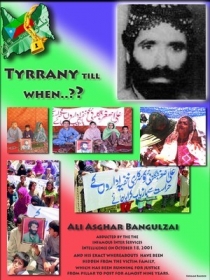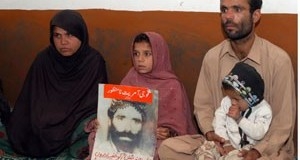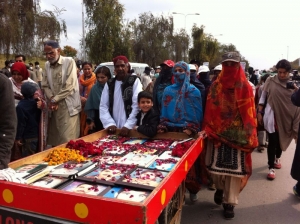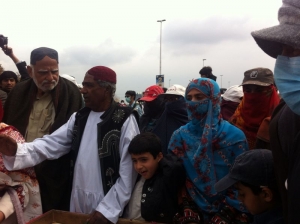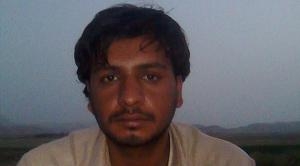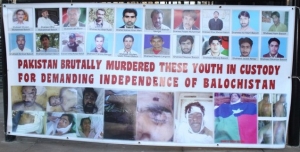By Ahmar Mustikhan
Baloch activists, who have escaped Pakistani tyranny, and who are now living in the freedom of Canada, are increasingly bringing the plight of their people and homeland to the notice of Canadian authorities.
Texas-sized Balochistan, named after the freedom-loving Baloch people –once called the wild herds of southwest Asia –, has been in the throes of a a popular uprising against Islamabad since early 2005 that has left countless dead. More than 8.000 freedom activists have been forcibly disappeared by Pakistan’s ruthless army – the fourth largest in the world – at one point or another during the last five years.
More than 1,100 are still missing. Of these, 300 activists were abducted in the last two-and-half years when Pakistan transitioned from military rule of coup leader General Pervez Musharraf to the civilian rule of “Mr. Ten Percent” President Asif Ali Zardari.
Aziz Baloch, originally from Panjgur, now lives in Vancouver, British Columbia, and is a member of the newly-launched International Voice for Baloch Missing Persons, Canada Chapter. On Wednesday, Aziz Baloch wrote a lengthy letter to the Canadian prime minister Stephen Harper detailing the plight of victims of enforced disappearances in Balochistan and asked Canada to help his hapless people.
Two other Canadian Baloch poet, intellectual and psychologist Dr. Zaffar Baloch; and analyst and TV commentator Imitaz Baloch are also founding members of the I.V.B.M.P.
In stead of wasting their time in what they call the “mental luxury of political polemics in Western drawing rooms,” all three are resolved to practically help their kith and kin back home and are busy helping fill out paperwork for victims of enforced disappearances.
The Sweden registered I.V.B.M.P. has chapters in U.S., U.K., Canada, Sweden, Norway, Switzerland and is an international extension of the Quetta-based Voice for Baloch Missing Persons.
Aziz Baloch informed Harper that on August 18 well-known Baloch lawyer, Zaman Khan Marri , was abducted by Pakistan’s security forces from Quetta. Marri was killed extra judicially on September 5, 2010 while he was in the custody of Pakistan security forces. “His body, which bore torture marks, was thrown in the city of Mastung,” Baloch informed Harper.
Earlier on August 15 2010, , two teachers Abdul Sattar and Safeer Ahmed and political activist Agha Abid Ali were abducted from Panjgur; on June 8, 2009 Zakir Majeed , a student leaders, intellectual and human rights defender was abducted from his hometown of Mastung.
All four are among the 1,100 still missing.
Baloch told Harper that family members of the 1,100 victims have run from pillar to post but the “entire state institutions are deaf, no one is listening and the international community is also ignoring their cry while Pakistan’s judicial system is toothless.”
He said sleuths of Pakistan intelligence agencies are abducting innocent Baloch civilians in Balochistan and treating them as “enemy combatants” whereas The Hague Declaration [NO. VII of 1907] clearly distinguishes between combatant versus non-combatants.
Just last month, bodies of 15 young Baloch activists were recovered in Balochistan. All 15 were earlier made victims of enforced disappearances, abducted by the intelligence agencies and paramilitary Frontier Corps in the presence of eyewitnesses.
Aziz Baloch said Pakistan’s security forces and establishment have formulated a strategic “state policy of terrorism” to exterminate and eliminate the Baloch nation. The state secret agencies and security forces have recently adopted a policy of cold-blooded, extra judicial and summary executions of abducted Baloch activists, who are first made victims of enforced disappearances.
“As Canadian citizens we are proud of our democratic government which has a history of supporting and protecting the innocent citizens, human rights activists, women and children around the globe who face oppression and are denied their legitimate rights,” he said.
According to the Universal Declaration of Human Rights act, article No. 3 ““Everyone has the right to life, liberty and security of person.”
“But Mr. Prime Minister, the Baloch nation has been denied these very basic human rights for more than six decades. Canada must act to stop Pakistan’s ongoing systematic and slow motion genocide in Balochistan and safeguard and protect the human rights of the Baloch people under international law,” Baloch urged.
Not many in the world know, Pakistan had forcefully occupied Balochistan on March 27, 1948 – Balochistan gained independent status on August 11, 1947, separately from Pakistan and India when the British departed from the Indian subcontinent.
Canada with its liberal and humanist policy towards refugees is home to a couple of hundred Baloch refugees families. Many of them were in the U.S. earlier but crossed the borders as they found Canada to be more liberal and welcoming of foreigners.
“Canada is a semi-socialist country,” says Nadir Baloch, head of the Baloch community in Toronto. In addition to Baloch from Pakistan and Iran, Canada is also home to Baloch immigrants from Afghanistan.
Balochistan is a vast territory – 43 percent of Pakistan’s land mass – and it is very rich in oil and gas. According to Frederic Grare, a Balochistan expert at the Carnegie Endowment for International Peace, Balochistan has an estimated 19 trillion cubic feet of natural gas reserves and six trillion barrels of oil reserves both on-shore and off-shore.
The area under Pakistani army occupation is slightly bigger than New Mexico. The area under Iranian mullahs is the size of Nevada, and that under Afghan control is the size of West Virginia. The total Baloch population in these areas is eight million, and seven million Baloch live elsewhere in the world.

